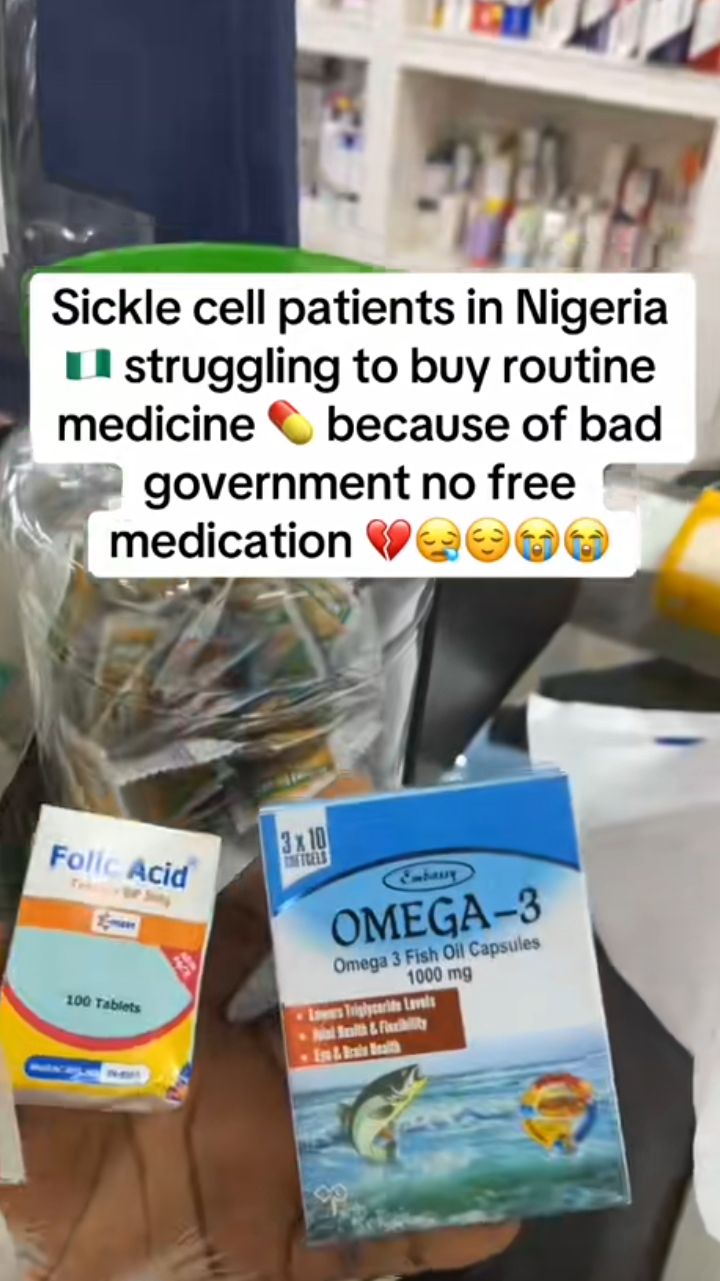
Sickle Cell Patients in Nigeria Lament High Cost, Lack of Government Support for Essential Medications

Sickle cell patients in Nigeria have taken to social media to express frustration over the rising cost of routine medications and the absence of government support, as the country grapples with the economic fallout of President Bola Tinubu’s policies.
A recent TikTok video posted by @d_sicklecellwarrior captured the daily struggle faced by individuals with the genetic blood disorder. The footage showed over-the-counter medications like folic acid and omega-3 supplements, routinely recommended for managing sickle cell disease, laid out with a caption that read:
“Sickle cell patients in Nigeria are struggling to buy routine medicine, because of bad government, no free medication.”
“Everything is just expensive everywhere,” one viewer commented under the video.
“Just doing counting over here,” another viewer commented, reflecting the helplessness many feel as they ration or forgo treatment due to costs.
Nigeria has the highest burden of sickle cell disease globally, with an estimated 150,000 children born with the condition every year. Yet, access to affordable care remains severely limited.
Folic acid is vital for red blood cell production, a process often impaired in sickle cell patients. Omega-3 fatty acids are sometimes recommended for their anti-inflammatory properties, which can help manage pain associated with the condition.
While these may be available over the counter, the recurring need for these and other prescribed medications can strain many Nigerians financially.
This growing crisis comes amid widespread economic hardship, worsened by the Tinubu administration’s disastrous policies.
Since assuming office in 2023, Tinubu has implemented aggressive subsidy removals, naira devaluations, and tax reforms that have sharply driven inflation. The result has been a staggering rise in the cost of living, including food, transportation, and basic healthcare, pushing millions deeper into poverty.
The lack of widespread government-provided medication for sickle cell disease has been a long-standing concern for patient advocacy groups, who argue that access to affordable and consistent medicines is essential for improving the quality of life and reducing the morbidity and mortality associated with the condition.
Read More:
- UTME 2025: Students Report Drastically Low Scores Compared to 2024, Demand JAMB Review Over Possible Technical Glitches
- Burkina Faso Showcases Locally-Made Light Armoured Vehicles
About The Author
Related Articles
Tinubu Government Delays Release of Signed Tax Acts to the Public
Four days after President Bola Tinubu announced the signing of four tax...
ByMayowa DurosinmiJune 30, 2025As Tinubu Urges Africa-Caribbean Unity in Saint Lucia, Over 272 Nigerians Killed in June Alone
While Nigerians deal with deadly violence, worsening hunger, and mass flooding, President...
ByWest Africa WeeklyJune 30, 2025You Can’t Tax a Dead Economy: Nigeria Is Suffocating Under Its Own Policies
As Nigeria’s Central Bank clings to its benchmark interest rate of 27.5...
ByWest Africa WeeklyJune 30, 2025“Wike is Not a Blessing to Us, He’s a Disaster” — Workers Protest in Nigeria’s Capital Over Unpaid Wages, Poor Working Conditions
Staff members of the Federal Capital Territory Administration (FCTA) in Abuja barricaded...
ByOluwasegun SanusiJune 30, 2025












Leave a comment